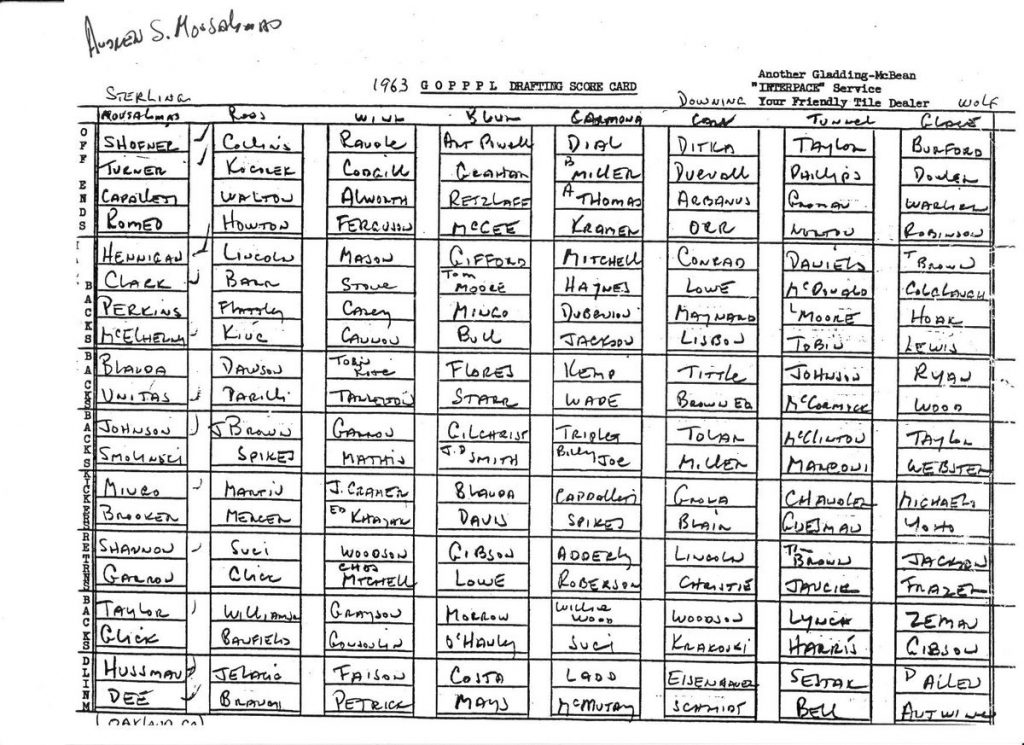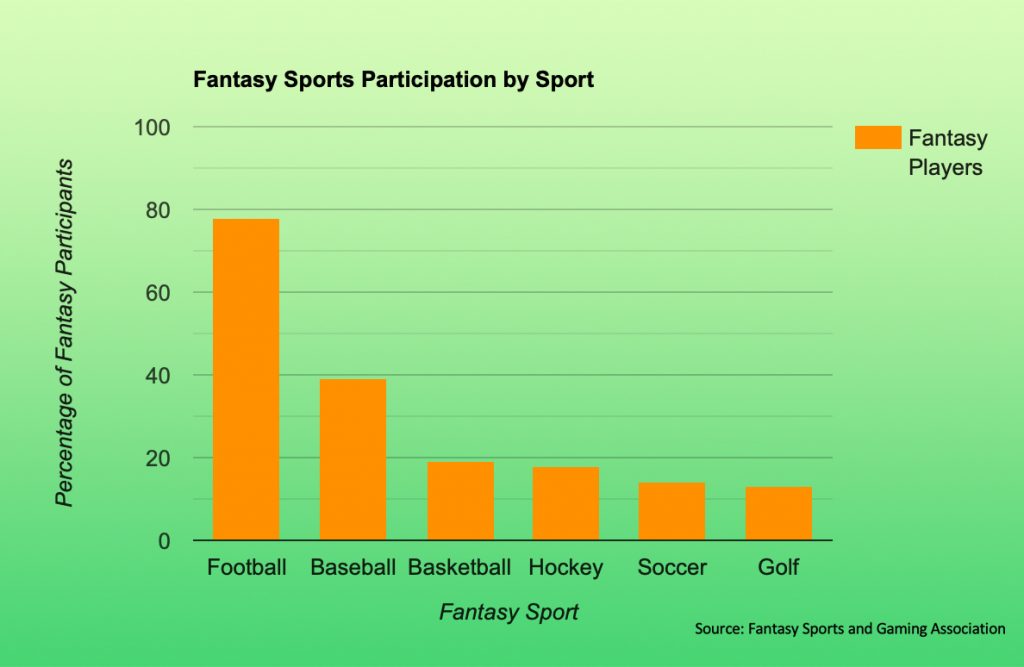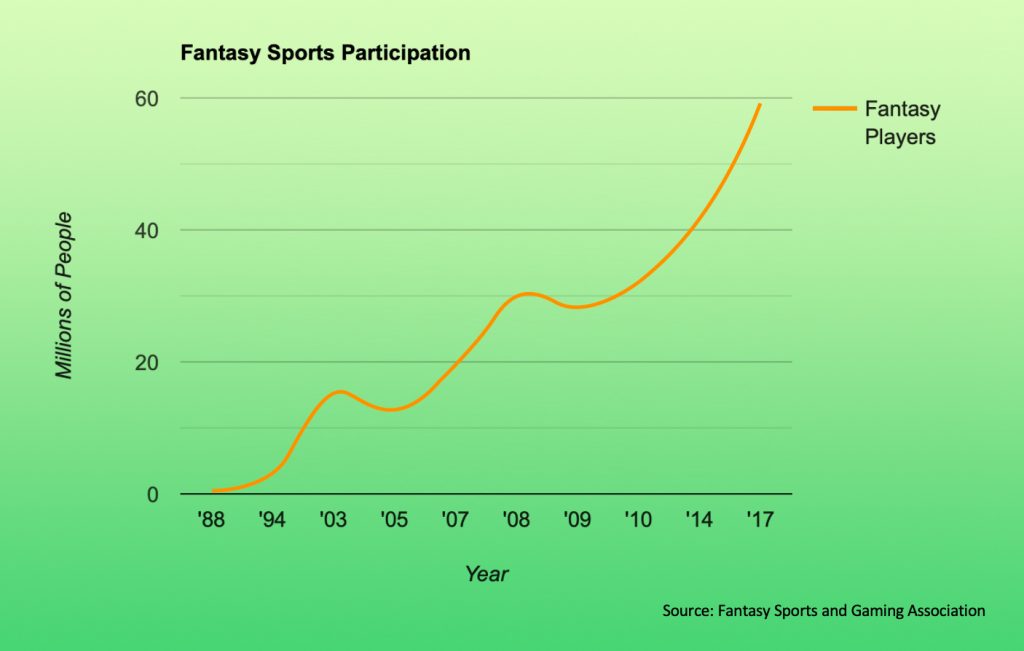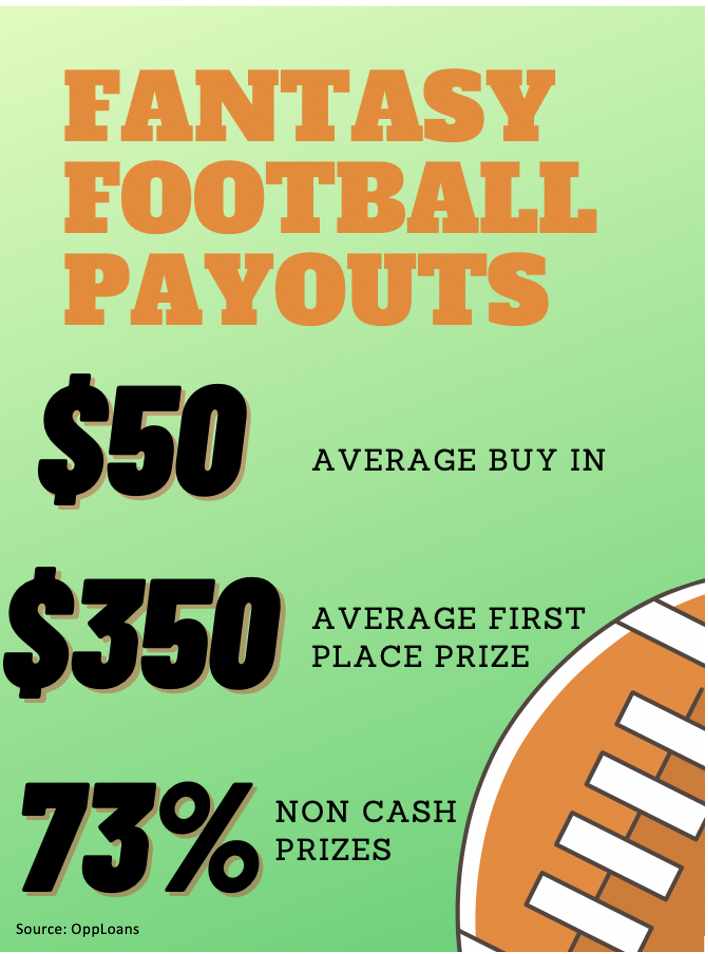By: Noah Camras
The average sports fan may have no idea who Bill Winkenbach is. I for one did not before writing this. Wilfred “Bill” Winkenbach may be one of the most influential figures in sports history. His ideas have forever changed the way we watch, follow and consume sports. He has forever changed what it means to be a sports fan. To those of you who have no idea who I’m talking about, that’s okay. It will all make sense soon. But I can tell you one thing. There’s a good chance Bill Winkenbach has impacted the way you watch sports.
The year was 1962. Winkenbach, then part-owner of the Oakland Raiders, was with some friends in a New York City hotel. Winkenbach, Raiders Public Relations Director Bill Tunnell and Oakland Tribune sportswriter (later turned Raiders PR Director) Scotty Stirling were discussing their beloved sport of football. However, there wasn’t much to love at the time. The Raiders were in the midst of an ugly 1-13 season. In the hopes of finding a way to combat the pain of their team having a down year, the three friends began to brainstorm. They landed on a crazy idea that allowed each person to be somewhat of a general manager to their own team. At the beginning of the season, each manager would draft players to their team, and benefit from real player statistics from every game. Before the following football season, Winkenbach and his friends created the Greater Oakland Professional Pigskin Prognosticators League, or the GOPPPL for short. The GOPPPL will forever be known as the world’s first fantasy football league.

Participation in fantasy sports has skyrocketed over the last three decades, with fantasy football convincingly leading the charge. A 2019 survey from the Fantasy Sports and Gaming Association found that 78% of people who participated in fantasy sports played fantasy football. The next highest was fantasy baseball with 39%.

The survey also looked at overall participation in fantasy sports. In 1988, an estimated 500,000 people played fantasy sports. In 2007, that number rose to 19.4 million. In 2017, the most recent year the study gathered data, there were an estimated 59.3 million fantasy sports participants. That means more than 46 million people played fantasy football in 2017. Put those people in one place and that’s the 31st largest country in the world, ahead of Argentina, Canada and Australia.

So fantasy football is popular. Clearly. But that’s hardly the most interesting thing about it. Fantasy football is changing the sport of football. Some say it’s improving it, others say it’s ruining it. But no one can argue that it’s making an impact.

“It changes the way people approach games. People are more likely to care about the outcome of a game for a team that may not be their favorite. It makes every single regular season game feel that much more important.”
Jake Shoyer, 21, 8 years of fantasy football experience.
“I don’t think that the NFL would be where it is today without fantasy football,” said Michael Fabiano, Sports Illustrated’s Senior Fantasy Analyst. Before fantasy football, people were passionate about their favorite team — and only their team. Fabiano, who has worked in fantasy for over 20 years, including 15 years with the NFL said, “Now, people no longer care just about the teams they root for or the teams in that division, they care about everybody.”
Stefan Sleep, an assistant professor at Kennesaw State University in Georgia, co-wrote and researched a 2019 study on the NFL viewer. His findings bear out Fabiano’s viewpoint. “You used to care about a certain team in a certain area,” Sleep said about the average NFL fan. “Now you care about all the different teams …[and] as you pay attention to all teams, you lose a connection to your team.” This is one side of the coin. Fans are caring more and more about their fantasy teams, and, in some cases, less and less about their hometown teams. Sleep, however, says fans aren’t necessarily caring about their favorite teams less. Rather, he says they have a “dual identity” to both their professional team and their own fantasy team.

“I think it’s made folks more into their own fantasy football team than a fan of the local team. Also [they’re] way more into individual stats than [they] would be without fantasy.”
Jana Goldberg, 44, 12 years of fantasy football experience.
This dual identity has greatly impacted the NFL. “Viewership is the biggest impact fantasy football is having on the NFL,” said Peter Schoenke, who helped found Rotowire, the first ever fantasy-centered online publication, in 1997. “It makes the average fan go beyond just their local team so they suddenly care about a Thursday Night game between two teams [they don’t care about].”
This is evident in the league’s Thursday Night Football ratings this season. The first Thursday Night game of the year between the New York Giants and Washington Football Team brought in an estimated 7.33 million viewers on the NFL Network, the largest season-opening TNF audience since 2017. Week 4’s TNF broadcast between the Cincinnati Bengals and Jacksonville Jaguars brought in 8.5 million viewers, the NFL Network’s most-watched TNF game since 2018. Week 6’s TNF game saw 14.5 million viewers across all platforms — NFL Network, Fox, Amazon Prime Video, Twitch, Yahoo Sports and Fox Deportes — while Week 7 brought in 13.1 million viewers. In Week 8, a battle between the Green Bay Packers and Arizona Cardinals became the third most-watched TNF game since the NFL partnered with Fox, when 20.4 million viewers tuned in. Thursday Night Football was the second most-watched television show of the 2020-2021 year, trailing only NBC’s broadcast of Sunday Night Football.

“I am more excited to watch a below average Thursday night game between Carolina and Jacksonville if I have a player or two ‘playing’ for my fantasy team.”
Heath Blumstein, 57, 18 years of fantasy football experience.
The league is clearly paying attention to these numbers. In an interview with Fantasy Sports and Gaming Association, David Jurenka, the Senior Vice President of Media for the NFL’s Los Angeles headquarters, described fantasy football’s impact on viewership. “If your team is 1-10 and yet your fantasy team is 10-1, I would argue you’re just as engaged,” Jurenka said. Even for a diehard football fan, watching your 1-10 team tank for the first overall pick in next year’s draft is never fun. Just ask Bill Winkenbach. But with fantasy football, you always have something to play for — and therefore a reason to keep tuning in.

“Since I’ve started playing I follow football a lot closer as a whole, instead of just following the Chicago Bears. I also think that fantasy football has made the sport more enjoyable to watch at times, especially when a fan’s team is not doing well.”
Jai Choudary, 21, 8 years of fantasy football experience.
Individual NFL teams have taken note of fantasy football’s impact on the league as well. David Weingarten, who works in Community Affairs and Engagement for the Los Angeles Rams, said that the team’s fantasy football leagues keep fans engaged during the season. “We’re in year two of our season ticket member league,” said Weingarten, and “we have about 34 head-to-head leagues this year.” With 34 head-to-head leagues — the standard fantasy football set-up where people play against one another to win — and about 10 or 12 teams per league, approximately 400 season ticket members are engaged for a full season of fantasy football directly through the Rams. They also have the opportunity to win prizes. Not only does this keep these fans interested no matter how the Rams play, but it incentivizes buying season tickets — and that means coming to games, spending money on food, spending money on team merchandise and so on. Even if the Rams lose, the organization wins.

“Fantasy football allows for people to be NFL fans rather than fans of individual teams. Overall I believe this increases the amount of time people spend consuming NFL content.”
Michelle Mankoff, 21, 11 years of fantasy football experience.
“Fantasy players are the best consumers of the NFL product,” said Rotowire’s Schoenke. Research shows that fantasy players go to more games, buy more jerseys and watch more football on Sundays. A 2002 survey conducted by the NFL found that the average male spent 6.6 hours a week watching the NFL. Fantasy players, however, watched 8.4 hours per week. Schoenke said that this was the key research that led the NFL to shift its views on fantasy. Instead of looking at the increased popularity of fantasy football as a negative, the NFL started promoting it to their viewers. The league’s best players even began to star in fantasy advertisement campaigns.

“It gives people a reason to root for players who aren’t necessarily on their favorite team. The NFL is now more individual-player focused than ever.”
Zach Fallas, 21, 10 years of fantasy football experience.
The NFL’s embrace of fantasy football has also paved the way for the NFL RedZone channel. The RedZone channel, founded in 2009, gave fans a new way to watch football. Rather than watching one game, or flipping between two channels, the RedZone channel’s whiparound coverage brought fans all the action from every game in real time. This kind of coverage has helped solve one of the NFL’s biggest viewing problems.
A 2020 study by FiveThirtyEight.com looked into the average amount of action in an NFL broadcast. Although most broadcasts last well over three hours, they deliver “a total of only 18 minutes of football action.” Other studies have even found those numbers to be as low as 11 minutes of action. This means fans tuning in to the local CBS or Fox NFL game on an average Sunday are giving more than three hours of their time to watch less than 20 minutes of football. In contrast, the RedZone channel, which constantly switches from game to game, brings fans nonstop action. As hosts Scott Hanson and Andrew Siciliano famously begin every telecast, it offers “seven hours of commercial-free football.”
However, while the RedZone channel was able to solve the problem of a lack of action, it wouldn’t have been able to take off without fantasy football. As NFL fans know, it’s sometimes difficult to keep up with all the action on Sundays, as up to 10 games can be occurring simultaneously. If you’re trying to keep up with all of the players on your fantasy team, it could be nearly impossible. But the RedZone channel was able to provide the solution to this problem, and do so in a way that really mattered to fantasy football players. Hanson, Siciliano and the RedZone channel vow to show “every touchdown from every game.” While touchdowns are the most exciting part of football, a last second touchdown in a 41-13 game doesn’t really mean anything — at least not to the average NFL fan. To the fantasy player, however, that touchdown could mean everything. That touchdown could be the difference between your fantasy team winning and losing in a week. It could be the difference between your fantasy team making the playoffs or not. It could be the difference between you making $350 or $0 (more on that later).
Leading up to its 200th episode last year, research estimated that 1-1.5 million people tuned into the RedZone channel each week. “A huge portion of their audience is paying attention because of fantasy,” said Sports Illustrated’s Fabiano. “And those guys both play fantasy,” Fabiano said in reference to hosts Hanson and Siciliano, “So trust me, they’re paying attention, too.”

“I personally grew up a massive Cowboys fan. But now on Sundays I tune into whichever game has my biggest fantasy asset at that time. Which is a shame because the Cowboys have an awesome young core of players to be excited about. But fantasy has made me a fan of individual players rather than teams…I also have very little interest in physically going to a football game because I’d spend the whole time checking on my fantasy players.”
Ross Stripling, 31, a former Los Angeles Dodger and current Toronto Blue Jays pitcher, 11 years of fantasy football experience.
Evan Rosenblum, the former Executive Producer of TMZ Sports and current Head of Triller Sports, says with fantasy, there’s more than just hometown pride on the line. “Before fantasy football became the juggernaut that it is, fans would follow football to root for their favorite teams. There was a sense of city pride and team pride,” Rosenblum said. “Now you have people that are so invested in how individual players produce because it’s more than just pride on the line … there’s an actual financial incentive.”
This financial incentive Rosenblum mentions is an interesting addition to the equation. A recent survey by OppLoans found that the average buy-in for a fantasy league this year was $50. This means that at the beginning of the fantasy football season, every player in the average league put $50 into a pool — a 10-team league would have $500 in the pool while a 12-team league would have $600 and so on. At the end of this season, that pool of money would be divided in some way among the best teams in the league, with the winner most likely getting the majority of it. The survey found that the average first-place prize for a league was $350, meaning second and even third-place finishers can receive money as well. The aforementioned Fantasy Sports and Gaming Association survey found that 73% of fantasy players pay for a non-cash prize, while 68% of fantasy players spend money on a league punishment.


“Instead of caring about a specific team, fans now only seem to care about how their players perform regardless of the team they are on. People may cheer for a player to do well against their favorite team and won’t care if their team loses as long as their fantasy player gets enough points for the week. “
Chloe Labelle, 20, 3 years of fantasy football experience.
A punishment is a common way for leagues to ensure that everyone in the league remains engaged. A league will “punish” the person who finishes in last place, incentivizing them to continue participating even if they don’t have a chance of winning. Sometimes this punishment is chosen by the entire league, while other times it’s just chosen by the winner. There are no standard rules for what a punishment should be, and many leagues get creative with it. Punishments have become a great way to ensure the league is remaining fair, and that no one gives up because they’re losing.
Before fantasy, the decision was simple: you root for your favorite team. Now, the question is, do you a) root for your favorite team or b) root for $350, a trophy and not getting punished by a bunch of your closest friends looking to publicly humiliate you. This decision is definitely a little tougher.
Rosenblum also said that fantasy football has been good for the NFL’s smaller markets. “Places like Jacksonville and Carolina … if they have a player who is a fantasy superstar, all of a sudden there’s more interest in their team than ever before.” Think Carolina Panthers running back Christian McCaffrey. McCaffrey has been an undisputed first-round fantasy pick for the last three years. He has been rostered in every single fantasy league since he was drafted in 2017. That means that the Panthers, who probably don’t have much of a fan base outside of Carolina, now have millions of fans tuning into their game each week to see how their first-round pick is doing. It’s no wonder McCaffrey constantly finds himself in the top 30 for jersey sales in the NFL.

“The younger generation sometimes has more allegiance to their fantasy players than their favorite team.”
Jason Bender, 52, 10 years of fantasy football experience.
Fantasy football has even impacted football itself. “I’m not going to say that the NFL changed the rules to make scoring more prolific because of fantasy football,” said Fabiano, “but it didn’t hurt.” The NFL has become a more offensive-centered sport over the past few decades, coinciding with the rise of fantasy football — a game primarily focused on the offensive side of the ball. “We all would much rather watch a game that’s 37-30 than 10-7,” Fabiano said. New rules protect the quarterback and “defenseless receivers” by restricting defensive players’ abilities to hit them. This has forced defenders to change the way they play — a way they’ve been taught since they were kids. And the players are taking notice. “When I used to play against [Ravens Hall of Fame Linebacker] Ray Lewis, I wouldn’t throw the ball to the middle of the field,” said Buccaneers Quarterback and future Hall of Famer Tom Brady in an interview before the season. “[Lewis] would hit [the receivers] and knock them out for the game. And now, every hard hit is a penalty on the defense…I feel like they penalize defensive players for offensive mistakes.” Brady called these changes “a real disservice to the sport.”
Whether it be a disservice or not, fantasy football is changing the sport of football and how we watch it.
When a player scores a touchdown, the broadcast flashes the player’s name responsible for it. Why? Fantasy football. Every game now has a ticker at the bottom of the screen that shows you other game scores and the major players’ stats. Why? Fantasy football. On Sundays, instead of only being able to watch the local games on CBS or Fox, you can turn on the RedZone Channel to watch all the games at once. Why? I think you already know the answer.
The more popular fantasy football gets — and it appears it’s only going to grow — the bigger the impact. The question isn’t, “Will fantasy continue to make an impact?” Rather, it’s, “What’s next?”
Could we see live fantasy football trackers on jumbotrons in stadiums? Will NFL stadiums start playing the RedZone Channel to ensure fantasy enthusiasts still come to games? How soon until there are 100 million people in America playing fantasy football — and what will that mean?
Peter Schoenke saw something back in the 90s. He knew there was a market for fantasy football. However, even he couldn’t foresee its ubiquitousness — and he has no idea what’s next. “I don’t really question how big it can get,” said Schoenke. “It’s already blown through any limitation I thought it could ever have.”
There are still many questions about the future of fantasy football, but one thing is certain. Millions of people around the country will sign up to play another season of fantasy football with their friends next year — and then again the year after that.
So as you finish your fantasy football season, or get ready for your next one, take a moment to thank Bill Winkenbach and the rest of the creators of the Greater Oakland Professional Pigskin Prognosticators League, as that fateful day in 1962 which brought them together, changed the sport of football for good.